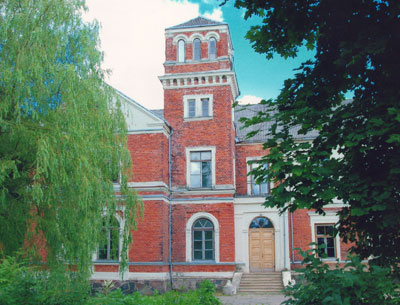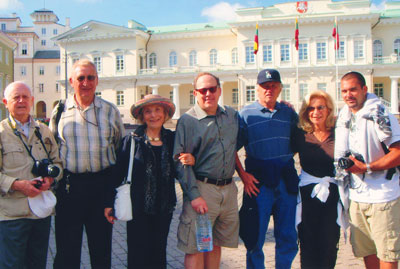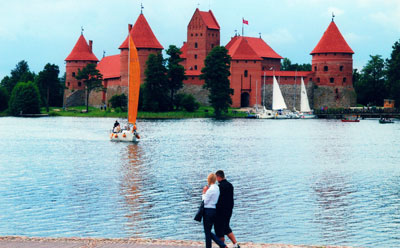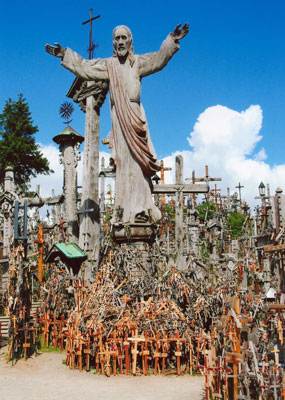Lithuania — A homecoming
by Donald Tremblay, Santa Monica, CA
For more than 50 years, since my wife, Lili, and I first met at UCLA, I had been hearing about the country of Lithuania — her birthplace and the area that she and her family had escaped from in advance of occupying Russian Communist forces during World War II. Much had transpired during the intervening years and, finally, with Lithuania in 1990 having again declared its independence, the opportunity to visit arrived.
Getting there
Although Lili and I are experienced world travelers, we somehow had never been able to fit a visit to Lithuania into our schedule. But when one of her three brothers returned to the country to reclaim family properties confiscated during the war, we had a reason to go.
Together with a second brother, his wife and their adult son, Lili and I and one of our own sons set out from Los Angeles for Lithuania in mid-July ’08, flying Lufthansa to Frankfurt on the first leg of our journey. People used to say that half the fun is in getting there, but that encouraging phrase no longer seems to apply.
It was no fun leaving home for the airport three hours prior to flight time, only to arrive at LAX to find an almost interminable line of passengers with their luggage inching along not through security but just to get to the Lufthansa ticket counter!
Then it was the familiar, and uncomfortable, process of facing security with all of its safeguards, demands and rudeness. Even when I believed that I had safely made it through the gauntlet, I was stopped and held back while my wife and the others breezed ahead. The ticket clerk had somehow overlooked signing her initials on my boarding pass, and for that I was taken aside (at the age of 78) and for several minutes treated like a suspect until someone corrected the oversight.
As expected, the flight on our Boeing 747 was fully booked. Although service aboard our plane was adequate, I found the food meager and almost inedible.
Once in Frankfurt, our attempt to reach our connecting flight to Eastern Europe with Lithuanian Airlines was another challenge. Along with encountering construction hazards within the airport facilities, we faced further confusion by having to change from one terminal to another without proper signage. We all felt that Frankfurt was a difficult place in which to maneuver. Language, on the other hand, was not necessarily a barrier.
Each round-trip airfare from Los Angeles to Frankfurt was $1,451 plus an additional $132 between Frankfurt and Vilnius.
Vilnius
We arrived in Vilnius, the capital of Lithuania, on a beautiful sunny afternoon. We were met by a family friend, and, in true tradition, the two ladies in our party each were greeted with a small bouquet of fresh flowers.
Our stay in the city had been prearranged by our travel agent of 20 years, Arline Fantone of Westside International Travel (Los Angeles, CA; 310/571-6090).
Booked into the Narutis Hotel (24 Pilies St.; www.narutis.com) in Vilnius’ Old Town at the daily rate of E115 ($175), we were delighted with its location — within walking distance of most historic landmarks of the capital — as well as the efficient service, the fact that nearly everyone spoke English (although my wife is a native Lithuanian speaker) and the inclusion of a sumptuous breakfast buffet served in the rustic basement restaurant.
City sights
Along with the local guide, my wife’s brother had arranged to take us around town to visit some of the familiar sights, such as the Presidential Palace (where, confidently, they have posted no security personnel), the Catholic basilica and the ancient tower guarded by the ever-vigilant statue of Grand Duke Gediminas. Traveling through narrow one-way streets just wide enough for some of today’s smaller cars and to innumerable other places of interest, we eventually ended up at the beautifully landscaped city cemetery.
There one can experience a different kind of history, both modern and ancient. Throughout the years, the city of Vilnius has been at the crossroads of invading and retreating armies. Not only did the Russians make their mark in the form of rigid “people’s” monuments, but other heroes of different eras also left their stories behind.
Remnants of Napoleon I’s Grand Army were buried there on their return from Moscow in 1812 and, more recently, extensive acreage was devoted to the 14 young Lithuanian patriots who, in 1991, demonstrated against continued Russian occupation — a brave gesture that helped fuel the country’s fight for renewed independence.
Throughout our stay in Vilnius, we found real hope for the country in its enthusiastic young people, the many foreign tourists, the increasing number of new cars on the streets, the absolute cleanliness of the place and a general joie de vivre.
Toward Varputenai
As exciting as any of the historical places we visited might have been, we could not make them the raison d’être of our trip. The principal reason we went to Lithuania was to return to my wife’s ancestral home in the town of Varputenai, a small hamlet in the north-central part of the country not too far from neighboring Latvia.
For this part of the voyage northward, the six of us traveled in a very comfortable late-model Mercedes van with driver. Traveling this way, we were able to observe the good roads and the modern gas stations complete with attached mini-marts and clean restrooms, to wonder about the large roadside billboards that were going up almost too rapidly everywhere, and to marvel at the rest-stop restaurants and other facilities located between cities. Progress was evident everywhere.
Since regaining their independence, the Lithuanians — with some help from Western sources — have picked themselves up by their bootstraps. Freedom has a way of producing such results.
Meaningful stops
Onward we went, heading first to Kaunas, the former capital of Lithuania and now its second-largest city. Another center of considerable progress since 1991, this was where Lili was born, in the early ’30s, and where her parents were married. Therefore, the place had special meaning for us. Development has been somewhat slower there than in the city of Vilnius, but things are nevertheless picking up.
With my wife’s fluency in the local language (plus Polish, Russian, German and Spanish), we easily made our way around on our own. Speaking to the locals was never a problem, and talking to them gave us much better insight into what was actually going on in the country.
Continuing farther north, we visited the Hill of Crosses, close to the city of S˘iauliai, where, in a sign of rebellion against the czars and, more recently, in solidarity with Stalin’s victims, more than 50,000 crosses and crucifixes have been placed over the years. This display is a vivid reminder to the world of this Catholic nation’s determination to fight oppression.
Coming home
Finally, we reached my wife’s homestead, a thousand-acre estate once referred to as a Dvaras. Properties of this type were large agricultural holdings developed under the czars over several hundred years when Lithuania was part of greater Russia.
Under the Communist occupation, however, everything was divided into small plots or developed into large collective farms and distributed to those who subscribed to the new regime. Original owners, like my wife’s family, were either forced to become refugees or sent into exile in Siberia. Everything that had been in her family for generations was lost.
Now, 50 years later, Lili had returned to what was left of her home and estate. Independence and new freedoms were not a panacea to wartime woes, however. Quite the contrary occurred after the country gained its newly found liberty.
Confusion reigned in the transition from communism to capitalism, when decisions were made by inexperienced bureaucrats. My wife’s brother, having the legal documents of ownership with which his parents had escaped, was able to reclaim small, disjoined portions of their land and buildings. This was what my wife had returned to.
At considerable personal effort and expense, her brother had devoted the previous two years to redeveloping the herd of cows then imported from Holland in the hope of restarting the cheese-making business for which this model estate of Varputenai had once been famous.
The family home, itself, was another matter. During the Russian occupation it had been turned into an agricultural school. The gardens had been neglected, ponds were overgrown and flowers no longer bloomed.
Authorities had added 10 classrooms to a house that already had more than 20 rooms. The shell was still there, but the original living spaces were no longer recognizable. So much had changed, but the building was still there and so were the memories.
Reflection
Adding a typical diet of local dishes, dark rye bread and fresh milk from the dairy herd, our stay in Varputenai was a comfortable and memorable one. With determination, my wife’s brother had begun the renewal process by turning one of the smaller work houses into a guest cottage, where we all stayed.
While our stay in Lithuania, generally, and Varputenai, in particular, was a happy occasion, leaving it was a somewhat sad one. My wife left her happy childhood memories of the 1930s behind, vividly remembered her years as a war refugee, and wondered whether she would ever visit her ancestral home again.





